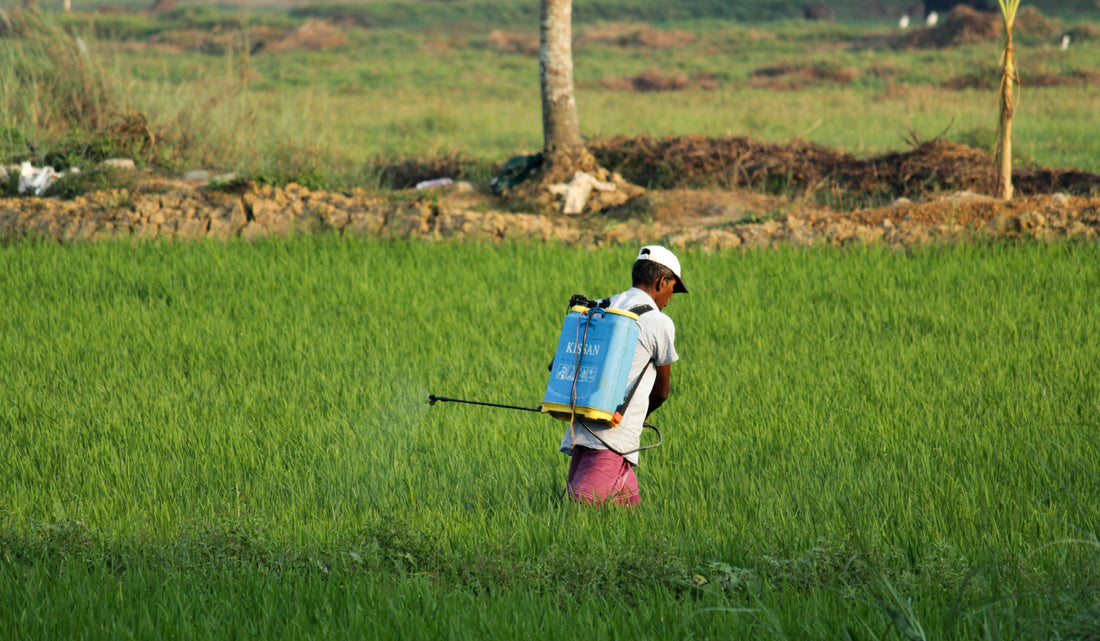
The Silent Danger: Long-Term Health Impacts of Chemical Pesticides in Daily Life
Share
Chemical pesticides have been hailed as a significant agricultural advancement, enhancing crop yield and food production. However, the widespread use of these chemicals has sparked increasing concern regarding their long-term impacts on human health. Let us delve into the potential risks posed by chronic exposure to chemical pesticides in our daily lives and offers insights into safer alternatives.
What Are Chemical Pesticides?
Chemical pesticides are substances used to prevent, destroy, or control pests that can damage crops and harm livestock. These include insecticides, herbicides, fungicides, and rodenticides. While their immediate benefits in agricultural productivity are undeniable, their residues can linger on food, contaminate water supplies, and accumulate in the soil, posing potential risks to human health.
Routes of Exposure
1. Dietary Intake: Pesticide residues can remain on fruits, vegetables, and other food products, leading to ingestion by consumers.
2. Occupational Exposure: Agricultural workers and those involved in pesticide application are at a higher risk due to direct contact.
3. Environmental Exposure: Contaminated water, soil, and air can lead to indirect exposure in the general population.
Long-Term Health Impacts
1. Neurological Effects: Prolonged exposure to certain pesticides, especially organophosphates, has been linked to neurological disorders. Studies suggest a higher risk of conditions such as Parkinson's disease, cognitive decline, and developmental delays in children.
2. Endocrine Disruption: Many pesticides act as endocrine disruptors, interfering with hormone functions. This disruption can lead to reproductive issues, developmental problems in children, and increased risks of cancers such as breast and prostate cancer.
3. Carcinogenic Potential: The International Agency for Research on Cancer (IARC) has classified several pesticides as carcinogenic or probably carcinogenic to humans. Chronic exposure to these substances increases the risk of cancers, including non-Hodgkin lymphoma and leukemia.
4. Respiratory Problems: Inhalation of pesticide particles can cause chronic respiratory issues such as asthma, bronchitis, and other lung diseases. Agricultural workers are particularly susceptible, but pesticide drift can also affect nearby communities.
5. Immune System Suppression: Some pesticides can suppress the immune system, making individuals more vulnerable to infections and diseases. This immunotoxicity can have long-lasting effects on overall health and well-being.
Vulnerable Populations
Certain groups are more vulnerable to the harmful effects of pesticides:
- Children: Due to their developing bodies and higher consumption of fruits and vegetables relative to their body weight, children are particularly susceptible to pesticide exposure.
- Pregnant Women: Exposure to pesticides during pregnancy can affect fetal development, leading to birth defects, low birth weight, and developmental delays.
- Elderly: Older adults may have weakened immune systems and other pre-existing health conditions that can be exacerbated by pesticide exposure.
While the benefits of chemical pesticides in agriculture cannot be ignored, their long-term health impacts demand serious consideration. By making informed choices and advocating for safer practices, we can reduce our exposure to these silent dangers and protect our health for the future. Transitioning towards sustainable farming practices and stringent regulatory measures is crucial in safeguarding both human health and the environment.
What Are Chemical Pesticides?
Chemical pesticides are substances used to prevent, destroy, or control pests that can damage crops and harm livestock. These include insecticides, herbicides, fungicides, and rodenticides. While their immediate benefits in agricultural productivity are undeniable, their residues can linger on food, contaminate water supplies, and accumulate in the soil, posing potential risks to human health.
Routes of Exposure
1. Dietary Intake: Pesticide residues can remain on fruits, vegetables, and other food products, leading to ingestion by consumers.
2. Occupational Exposure: Agricultural workers and those involved in pesticide application are at a higher risk due to direct contact.
3. Environmental Exposure: Contaminated water, soil, and air can lead to indirect exposure in the general population.
Long-Term Health Impacts
1. Neurological Effects: Prolonged exposure to certain pesticides, especially organophosphates, has been linked to neurological disorders. Studies suggest a higher risk of conditions such as Parkinson's disease, cognitive decline, and developmental delays in children.
2. Endocrine Disruption: Many pesticides act as endocrine disruptors, interfering with hormone functions. This disruption can lead to reproductive issues, developmental problems in children, and increased risks of cancers such as breast and prostate cancer.
3. Carcinogenic Potential: The International Agency for Research on Cancer (IARC) has classified several pesticides as carcinogenic or probably carcinogenic to humans. Chronic exposure to these substances increases the risk of cancers, including non-Hodgkin lymphoma and leukemia.
4. Respiratory Problems: Inhalation of pesticide particles can cause chronic respiratory issues such as asthma, bronchitis, and other lung diseases. Agricultural workers are particularly susceptible, but pesticide drift can also affect nearby communities.
5. Immune System Suppression: Some pesticides can suppress the immune system, making individuals more vulnerable to infections and diseases. This immunotoxicity can have long-lasting effects on overall health and well-being.
Vulnerable Populations
Certain groups are more vulnerable to the harmful effects of pesticides:
- Children: Due to their developing bodies and higher consumption of fruits and vegetables relative to their body weight, children are particularly susceptible to pesticide exposure.
- Pregnant Women: Exposure to pesticides during pregnancy can affect fetal development, leading to birth defects, low birth weight, and developmental delays.
- Elderly: Older adults may have weakened immune systems and other pre-existing health conditions that can be exacerbated by pesticide exposure.
While the benefits of chemical pesticides in agriculture cannot be ignored, their long-term health impacts demand serious consideration. By making informed choices and advocating for safer practices, we can reduce our exposure to these silent dangers and protect our health for the future. Transitioning towards sustainable farming practices and stringent regulatory measures is crucial in safeguarding both human health and the environment.




